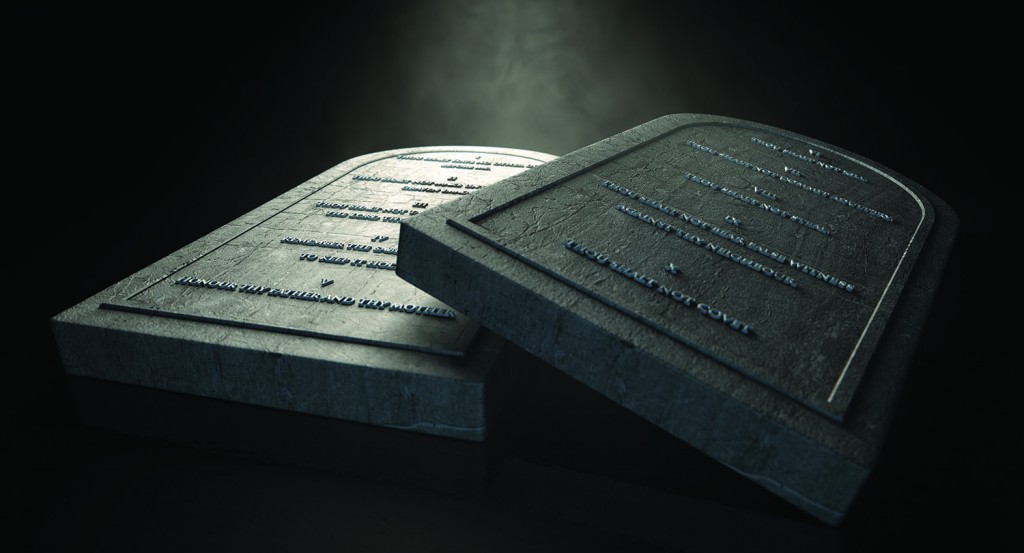
Feb 25, 2015
Introduction to a Sermon Series
by Pastor Dusty Mackintosh, Next Step Christian Church
Thornton, CO
10 Commandments, old and busted
We are about to embark on a series within a series. This is a landmark in Israel’s history, the meat and potatoes of the Mosaic covenant. Just in human history, this stands as some of the oldest written laws known…and certainly the most influential. They hang prominently in our Supreme Court to this day. No bets on how long they stay there, though. At the mention of the 10 Commandments, a whole host of concerns and questions arise. What about freedom from the law? That’s old and busted, Old Testament stuff! What about forgiveness and grace? What about a legacy of using these laws to judge…or even abuse people?
We are going through these commandments in detail, but not because they are historically influential or because this was a literal pivotal moment for the people of Israel. We focus in excruciating detail because this portion of Scripture, these commandments, in a unique and powerful way, applies directly to us today. And it does because of the reason the 10 commandments were given, all the way back around 3300 years ago.
Set the Stage – Fear and Trembling
The Israelites approach Mount Sinai and camp out there for three days, waiting to hear the rest of the covenant. What are these commands they are to obey? And while they are waiting, the presence of God is manifesting upon the mountain and the earth is boiling. There is fire and smoke, the ground is shaking, the sky is filled with lightning, imagine the rolling thunder on top of earthquakes…and then the voice of God rolls forth from the mountain.
The people are told not to approach too close at the wrong time…or they will die. They cleaned themselves and their clothes, they prepared, they purified. The setting of the giving of the 10 Words (as the Hebrew actually refers to the Big Ten) is one of fear and trembling. Picture less Charlton Heston, more Sauron and Mount Doom.
What do they know about God at this point? As Abba, Father…no. This powerful god-being is an entity more powerful than any they had known, who had struck down the greatest earthly power they (or anyone) had known. Now he has been localized for a few weeks as this pillar of cloud and fire…but the pillar is now unchained, it is engulfing this mountain.
And they were terrified.
Founded in Relationship
It is in this context that Yahweh reminds them of what they know so far. Yes, they are terrified (and fear of Yahweh is the beginning of wisdom). Yes, if they get too close, in the wrong way, they will die. The danger is real.
Exodus 20:1-2: And God spoke all these words:
2 “I am the Lord your God, who brought you out of Egypt, out of the land of slavery. So before you hear a single one of my Words, my commandments, my laws; know this: I am the I AM, your God, the one who has saved you.”
The Purpose of the Commandments:
Relationship
This breathes some life into these commandments, but why did God give them? What was his purpose in all these “thou shalls” and “thou shall nots?”
How about to arm the judging-spirit within all of us with a way to condemn those around us? A little measuring stick to assert my religious moral superiority over you:
“I keep 8/10 and you only keep 7/10.” That’s great for us Sabbath keepers because we get that X factor, plus 1
to all 10 commandment tests. This was the law of the Pharisees and we have all been tempted, and probably have used these 10 commandments that way, at least in our internal monologues. But this was not their purpose.
How about: To kick the ant hill? To watch humanity struggle and fail miserably so they’d be really happy when Jesus came? Ouch! Just to set an impossible
standard — that’s kind of sadistic.
I think these ideas sit in the back of our minds. “Yeah, that’s kind of why he did it,” we think. But it’s okay now because of “Jesus.” Because Paul puts so much focus in Romans on the way the law can and does operate in preparing the way for God’s grace, it is really easy to take that as the whole purpose of the law. But, the purpose of the commandments of God were actually understood correctly by that first generation of Israel — as if God
successfully communicated his intent — imagine that.
Having just reiterated all 10 commandments, Moses at the end of his life included these parting words to the people of Israel. They said it over and over again, every day, in summary of the Big Ten:
Deuteronomy 6:4-6: 4 Hear, O Israel: The Lord our God, the Lord is one. 5 Love the Lord your God with all your heart and with all your soul and with all your strength.
6 These commandments that I give you today are to be on your hearts.
Jesus, when asked which commandment was the greatest of all, clarified the connection by quoting this verse. He added another quote from Leviticus as the 2nd greatest commandment “Love your neighbor as yourself.” Then he said this — and this is the most important thing to understand in any reading or study of the Law:
Matthew 22:40: All the Law and the Prophets hang on these two commandments.
It all “hangs.” It all “depends.” I have a few “dependents” in my house. I get to claim them on my taxes. The government lets me keep some money because it understands that these three little people depend upon me, they hang upon me, for life (for food, safety, security), for the stuff of their life. In the same way, all the Law, and everything the Prophets said in applying that Law and redirecting the people to keep that law appropriately, all of it depends upon this love-relationship. Love of God. Love of one another. Which is to say that the purpose, from day one, was to show us what love is. What it looks like when applied to morality. How do I love God? How do I love my neighbor.
Just as the law was founded in relationship, so it was for the purpose of relationship. The 10 commandments were founded in relationship for the purpose of relationship.
Commandments: the forever course of righteousness
What does that look like? How do I love God and one another? The Apostle John, who always called himself the “disciple that Jesus loved” connected our relationship with God and our keeping of His commandments in this way:
1 John 2:3-5: 3 We know that we have come to know him if we keep his commands. 4 Whoever says, “I know him,” but does not do what he commands is a liar, and the truth is not in that person. 5 But if anyone obeys his word, love for God is truly made complete in them. This is how we know we are in him: 6 Whoever claims to live in him must live as Jesus did.
Jesus kept every one of those 10 commandments, all the time, and lived a perfectly righteous life.
The commandments then become signposts marking the way. Screaming warning signs that say “Uppp, you’ve gone too far, this is not what love looks like.” Or “Yes, do this, this is the kind of thing love for God does.” This is the kind of thing love for neighbor does. Is it optional? No — these are precisely the sorts of things that love
always does. These “shall nots” are the things love never does. If you are doing these things, it is ludicrous to say that you are loving God with all your heart, mind and soul, or your neighbor as yourself.
The law is never the source of righteousness, it is forever the course of righteousness.
The law marks out the course, it gives directions at the turns. I raced in a triathlon, and at every turn, especially when we were out on the streets on this long bike turn,
it would say, “Olympic triathlons, straight ahead” or “turn right here” all the way. So at the intersections I would know which way to go. The law, the 10 commandments in particular, in a special way, forever mark out the course of right relationship, of love relationship with God. That is simply what loving God looks like, what
loving each other looks like. It doesn’t cover every step, every moment, every instance, but it is a blazing very clear sign at the major intersections of life. As we hear each Word of God, each Command, let us look for and hear the love language of God. He tells us this because he loves us, because He wants us to love him and love each other.
(To be continued)


